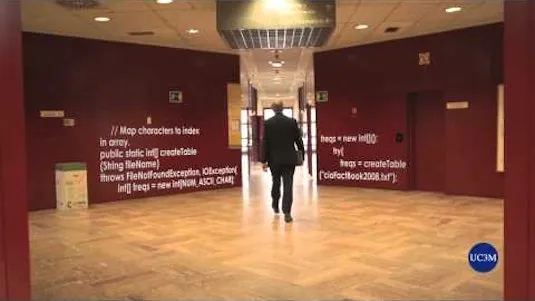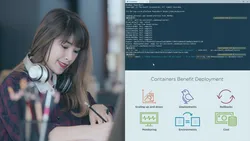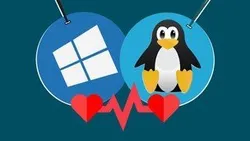
Docker for Developers 
Developers can use Docker to increase their productivity and efficiency. This course covers how to use Docker for front-end, back-end, and full-stack projects, as well as how to approach CI/CD with Docker. ▼
ADVERTISEMENT
Course Feature
![]() Cost:
Cost:
Free Trial
![]() Provider:
Provider:
LinkedIn Learning
![]() Certificate:
Certificate:
No Information
![]() Language:
Language:
English
![]() Start Date:
Start Date:
Self Paced
Course Overview
❗The content presented here is sourced directly from LinkedIn Learning platform. For comprehensive course details, including enrollment information, simply click on the 'Go to class' link on our website.
Updated in [March 06th, 2023]
This course, Docker for Developers, provides an overview of the Docker platform and how it can be used in the development process. Students will learn how to install Docker on Windows, Linux, and Mac computers, and how to use the platform when developing front-end, back-end, and full-stack projects. The course will also cover how to approach CI/CD with Docker, as well as explore other tools, including Kubernetes, the widely-used container orchestration engine. By the end of the course, students will have a comprehensive understanding of Docker and how to use it in their development projects.
[Applications]
After completing this course, students should be able to apply their knowledge of Docker to their development projects. They should be able to install Docker on Windows, Linux, and Mac computers, use the platform when developing front-end, back-end, and full-stack projects, and approach CI/CD with Docker. Additionally, students should be able to explore other tools, including Kubernetes, the widely-used container orchestration engine.
[Career Paths]
1. DevOps Engineer: DevOps Engineers are responsible for managing the development, testing, and deployment of applications and services. They use Docker to automate the process of building, testing, and deploying applications, as well as to manage the underlying infrastructure. This role is becoming increasingly important as organizations move towards a more agile and automated approach to software development.
2. Cloud Engineer: Cloud Engineers are responsible for managing cloud-based applications and services. They use Docker to deploy and manage applications in the cloud, as well as to manage the underlying infrastructure. This role is becoming increasingly important as organizations move towards a more cloud-based approach to software development.
3. Containerization Engineer: Containerization Engineers are responsible for managing the deployment and maintenance of containerized applications and services. They use Docker to deploy and manage applications in containers, as well as to manage the underlying infrastructure. This role is becoming increasingly important as organizations move towards a more containerized approach to software development.
4. Kubernetes Engineer: Kubernetes Engineers are responsible for managing the deployment and maintenance of Kubernetes clusters. They use Docker to deploy and manage applications in Kubernetes clusters, as well as to manage the underlying infrastructure. This role is becoming increasingly important as organizations move towards a more Kubernetes-based approach to software development.
[Education Paths]
1. Bachelor of Science in Computer Science: This degree path provides students with a comprehensive understanding of computer science fundamentals, including programming, software engineering, and computer architecture. Students will also learn about the latest trends in computer science, such as artificial intelligence, machine learning, and cloud computing. With the rise of Docker, students will also gain an understanding of containerization and how to use Docker in their development projects.
2. Bachelor of Science in Software Engineering: This degree path focuses on the development of software applications and systems. Students will learn about software design, development, and testing, as well as the principles of software engineering. With the increasing popularity of Docker, students will also gain an understanding of containerization and how to use Docker in their development projects.
3. Master of Science in Cloud Computing: This degree path focuses on the development and deployment of cloud-based applications and services. Students will learn about cloud computing fundamentals, such as virtualization, distributed computing, and cloud security. With the rise of Docker, students will also gain an understanding of containerization and how to use Docker in their cloud-based projects.
4. Master of Science in Artificial Intelligence: This degree path focuses on the development of intelligent systems and applications. Students will learn about artificial intelligence fundamentals, such as machine learning, natural language processing, and computer vision. With the increasing popularity of Docker, students will also gain an understanding of containerization and how to use Docker in their AI projects.
Course Syllabus
Introduction
Leverage the power of Docker
What you should know
Course Provider

Provider LinkedIn Learning's Stats at AZClass
Discussion and Reviews
0.0 (Based on 0 reviews)
Explore Similar Online Courses

Measure Your Marketing with Google Analytics

Introduction to Java Programming: Writing Good Code

Python for Informatics: Exploring Information

Social Network Analysis

Introduction to Systematic Review and Meta-Analysis

The Analytics Edge

DCO042 - Python For Informatics

Causal Diagrams: Draw Your Assumptions Before Your Conclusions

Whole genome sequencing of bacterial genomes - tools and applications

Managing Docker on Linux Servers

Fundamentals of Docker and Kubernetes for NET Developers


Start your review of Docker for Developers